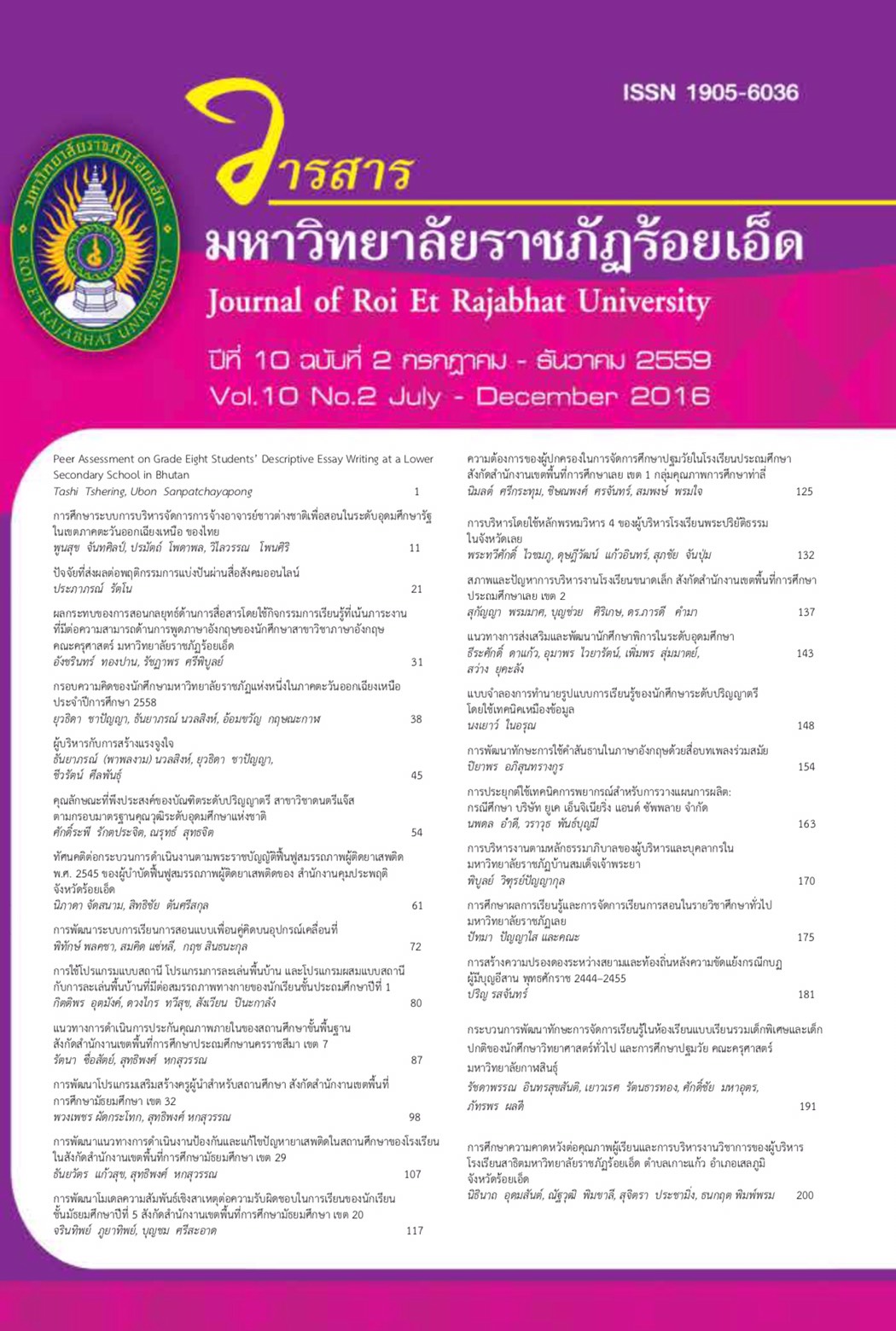Peer Assessment on Grade Eight Students’ Descriptive Essay Writing at a Lower Secondary School in Bhutan
Keywords:
Peer assessment, Descriptive Essay Writing, Lower Secondary SchoolAbstract
This research was conducted to explore how Grade Eight students developed and valued peer assessment in descriptive essay writing. The study was conducted in a Lower Secondary School in Bhutan in the second semester of the school year 2015 from August until the end of September. The study was conducted with 35 Grade Eight students in a Lower Secondary School in Bhutan. These 35 participants were selected based on the scores they have secured in their descriptive essay writing in the midterm exam in 2015. The researcher adopted mixed method research design for the study. Data were collected from interviews, questionnaires, students’ reflective journals and teacher’s journal.
The first finding discovered that the development of peer assessment encouraged the participants to shoulder the responsibility as the assessors, enhanced collaboration among the peers, improved their language in writing essay, and provided them the opportunity to experience peer assessment. The second finding from the study revealed that peer assessment training improved participants’ learner satisfaction. The post-questionnaire (Part II) helped the researcher in confirming this finding. The overall mean which
References
Beaver, C., & Beaver, S. (2011). “The Effect of Peer-Assessment on the Attitudes of Pre-Service Elementary Service Elementary and Middle School Teachers about Writing and Assessing Mathematics,” Issues in the Issues in the Undergraduate Mathematics Preparation of School Teachers. 5: 14.
Brown, S. (Ed.). (1998). Peer assessment in practice. Birmingham: SEDA. Cassidy, S. (2006). “Developing employability skills: Peer assessment in higher education,” Education+ Education+ training. 48(7):508-517.
Department of Curriculum and Research Department. (2014). PP-XII English Framework. Bhutan: Ministry of Education.
Dollard, N., &Christensen, L. (1996). Constructive classroom management,” Focus on Exceptional Focus on Exceptional Children. 29(2):1-12.
Gelb, I., & Whiting, R. (1993). Academic American Encyclopedia. Grolier, Danby, Connecticut. Gokhale, A.A. (1995). “Collaborative learning enhances critical thinking,” Journal of Educational Journal of Educational Technology.
Gooden-Jones, E. (2000). “Developing Writing Proficiency through Cooperative Learning Strategies in Limited Proficient College Students,” Dissertation Abstracts International
Lundstrom, K., & Baker, W. (2009). To give is better than to receive: The benefits of peer review to the reviewer's own writing,” Journal of second language writing. 18(1): 30-43.
McLaughlin, P., & Simpson, N. (2004). “Peer assessment in first Year University: How the students feel,” Studies in Educational Evaluation. 30(2): 135-149.
Min, H.T. (2006). “The effects of trained peer review on EFL students’ revision types and writing quality,” Journal of second language writing Journal of second language writing. 15(2) : 118 - 141
Sahin, S. (2008). “An application of peer assessment in higher education,” The Turkish Online Journal The Turkish Online Journal of Educational Technology. 7(2): 6.
Sluijsmans, D. M., Brand-Gruwel, S., van Merriënboer, J. J., & Martens, R. L. (2004). “Training teachers in peer-assessment skills: effects on performance and perceptions,” Innovations inEducation and Education and Teaching International Teaching International. 41(1 41(1) ): : 59 59-78.
Stefani, L.A. (1994). “Peer, self and tutor assessment: Relative Peer, self and tutor assessment: Relative reliabilities,” Studiesin Higher in Higher Education,19(1):69-75.
Watkins, C., Carnell, E., & Lodge, C. (2007). Effective learning in classrooms. Paul Chapman Educational. White, E. (2009). “Student perspectives of peer assessment for learning in a public speaking Student perspectives of peer assessment for learning in a public speaking course,” Asian EFL Journal. 33(1): 1-36.
Downloads
Published
How to Cite
Issue
Section
License
บทความที่ได้รับการตีพิมพ์เป็นลิขสิทธิ์ของวารสารมหาวิทยาลัยราชภัฎร้อยเอ็ด
ข้อความที่ปรากฏในบทความแต่ละเรื่องในวารสารวิชาการเล่มนี้เป็นความคิดเห็นส่วนตัวของผู้เขียนแต่ละท่านไม่เกี่ยวข้องกับมหาวิทยาลัยราชภัฎร้อยเอ็ด และคณาจารย์ท่านอื่นๆในมหาวิทยาลัยฯ แต่อย่างใด ความรับผิดชอบองค์ประกอบทั้งหมดของบทความแต่ละเรื่องเป็นของผู้เขียนแต่ละท่าน หากมีความผิดพลาดใดๆ ผู้เขียนแต่ละท่านจะรับผิดชอบบทความของตนเองแต่ผู้เดียว





